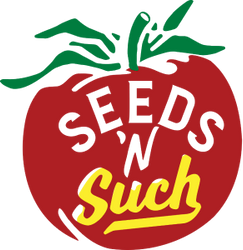
Why Home Vegetable Gardeners Should Also Plant Flower Seeds
In our recent Seeds ‘n Such catalog editions, we have inserted samples of proposed flower seed offerings, and asked for your response regarding your desire for inclusion of these and other such flower seed varieties in our future catalogs. Our founder and owner, J. Wayne Hilton, noted that flower seed sales exceeded vegetable seeds back in the 1990s when he owned a variety of both flower-seed and vegetable-seed catalogs, “but today, grower-quality flower seeds are nearly impossible to find for home gardeners and small growers.” The response we received last year was overwhelming, and we have added over 200 varieties of the finest flower seed varieties to our new Spring 2017 catalog.
Many of us home gardeners are mostly concerned about growing fruits and vegetables, so why should we be interested in an extensive flower seed listing? Many veteran home gardeners and small produce farmers are already aware that approximately one-third of all fruits and vegetables must be pollinated by honeybees or other native bees and insects in order to produce. According to the Xerces Society Guide, Attracting Native Pollinators: Protecting North America’s Bees and Butterflies, “Consumers are starting to recognize that the most nutritious and interesting parts of their diet—apples, watermelons, blueberries, carrots, broccoli, almonds, orange juice, coffee, and chocolate, to name but a few—are the result of insect pollination.”
And most of us have heard about the major declines in our populations of honeybees, bumblebees, and other native bee and insect pollinators due to a number of environmental factors, but more and more independent research is proving that our greatest causal factor is our massive dependence on the use of more powerful pesticides for our food production. One group of relatively new systemic insecticides—neonicotinoids—which are also classified as “neurotoxins,” have shown to be especially deadly for honeybees and other pollinators, but also many other beneficial insects, including monarch and other butterflies, and even some small animals.
So that all home gardeners can help to protect our precious pollinators, the Xerces Society urges us to get on board and plant flower seeds for food and establish homes for them and other beneficial insects. Sadly many of the flowering plants offered at nurseries, box stores and garden centers have been pre-treated with these same chemicals, so the best way to insure your flowers are safe for your pollinator habitat is to grow your own from seeds, and we at Seeds ‘n Such are ready to be your flower seed source. Won’t you and your family, friends and neighbors join us in this “vital cause of pollinator conservation?”
Be sure to choose from the all-time favorite annual and perennial flower seeds listed on pages F-1 through F-16 and on the Order Form Insert at the center of our new Spring 2017 catalog to get started feeding your pollinators this growing season!
